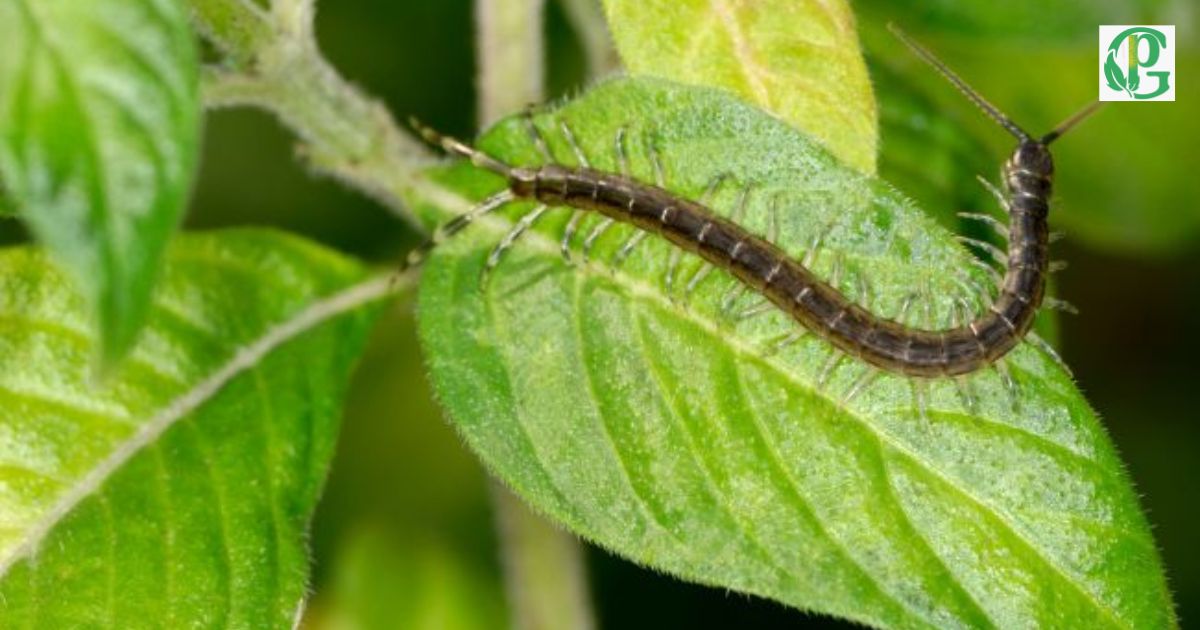Centipedes are not generally bad for gardens. In fact, they can be beneficial because they eat smaller pests like insects and larvae that can harm plants. Centipedes help maintain a natural balance in the garden.
Curious about your garden’s tiny residents. Are centipedes bad for gardens? Discover the truth and learn how to keep your garden thriving with these essential tips. Uncover the secrets of centipedes in your garden and take action for a greener, healthier outdoor space.
In some cases, centipedes might become a problem if their population gets too high. They can sometimes feed on earthworms and other beneficial creatures. But overall, centipedes are more helpful than harmful in the garden.
What do centipedes eat in the garden?
Centipedes in the garden have a crucial role as natural pest controllers. They feast on a diet of various insects and larvae, including garden pests like aphids, caterpillars, and mites. This makes them valuable allies in maintaining a healthy garden ecosystem.
While centipedes primarily target pests, they might occasionally feed on small earthworms and other tiny creatures. Overall, their appetite for garden troublemakers outweighs any potential harm, contributing to a more balanced and thriving garden environment.
Will Centipedes Damage My Garden?
Centipedes are typically not garden troublemakers. In fact, they often serve as garden allies. These arthropods primarily feast on smaller pests like insects and larvae, protecting your plants from potential harm. They’re like nature’s pest control team, helping maintain a healthy garden ecosystem.
While centipedes are generally beneficial, it’s essential to keep their population in check. In rare cases, they may nibble on earthworms or other helpful creatures. However, overall, centipedes are more likely to be garden protectors rather than garden destroyers.
| Aspect | Centipedes in Gardens |
| Appearance | Long, segmented bodies with many legs |
| Diet | Carnivorous, feeding on insects |
| Beneficial or Harmful | Generally beneficial for gardens |
| Predation | Prey on harmful garden pests |
| Pest Control | Control populations of insects such as aphids, caterpillars, and beetles |
| Soil Aeration | Burrowing activity helps improve soil aeration |
| Decomposition | Aid in breaking down organic matter |
| Plant Damage | Rarely damage healthy plants |
| Potential Issues | May occasionally prey on beneficial insects |
| Population Control | Maintain a balance in the garden ecosystem |
| Conclusion | Centipedes are mostly beneficial as natural pest controllers in gardens. However, they should be coexisting with other beneficial insects. Regular monitoring is advisable. |
What’s The Best Way To Keep Centipedes Out Of My Home And Garden?
To keep centipedes out of your home and garden, start by eliminating their hiding spots. Remove clutter in your garden and seal any cracks or gaps in your home’s foundation to reduce their entry points. Ensure good drainage to prevent moisture buildup, as centipedes thrive in damp conditions.
Using natural repellents like diatomaceous earth or cedar chips can also deter centipedes. In your home, maintain cleanliness and reduce humidity levels to make it less inviting for these creatures. If centipede infestations persist, consider seeking professional pest control assistance to keep your living space centipede-free.
Benefits Of Centipede
Centipedes offer several benefits to the environment. One of their primary advantages is their role as natural pest controllers. They help keep populations of harmful insects in check by preying on them, reducing the need for chemical pesticides in gardens and agricultural settings.
Additionally, centipedes aid in soil health by aerating and turning over the soil as they burrow. This helps improve soil structure and promotes better root growth in plants. Their presence contributes to a balanced and healthy garden ecosystem, making them valuable allies for gardeners and farmers alike.
Natural Pest Control
Natural pest control is when beneficial organisms, like centipedes, help manage and reduce harmful insect populations. Centipedes are voracious predators, feeding on insects and pests in gardens and homes. Their presence can help keep unwelcome insects, such as aphids and caterpillars, in check. This eco-friendly approach to pest management can lead to healthier plants and fewer chemical pesticides, promoting a more balanced and sustainable environment.
Soil Aeration and Turnover
Soil aeration and turnover are vital roles that centipedes play in the garden. As these creatures move through the soil, they burrow and create channels, allowing air and water to penetrate deep into the ground. This aeration improves soil structure, nutrient distribution, and enhances root growth, contributing to healthier and more robust plants.
Nocturnal Predators
Nocturnal predators are creatures that hunt and thrive during the night. They have adapted to the darkness and often possess special senses like night vision to aid in their hunts. These animals, including owls, bats, and many insects like centipedes, play vital roles in controlling pest populations, making nighttime a crucial time in the natural world for maintaining ecological balance.
Low Maintenance Helpers
Low maintenance helpers, like centipedes, play a crucial role in gardens and ecosystems. These tiny creatures require little to no care while contributing to pest control and soil health. Their natural presence aids in maintaining a balanced and thriving environment, making them valuable allies for any gardener or nature enthusiast.
Garden Health and Balance
Garden Health and Balance:
Centipedes play a vital role in maintaining the health and balance of your garden ecosystem. They help control the population of smaller pests, ensuring that harmful insects don’t overrun your plants. By preying on insects and larvae, centipedes keep the natural order in check, reducing the need for chemical pesticides.
Beneficial Allies in Ecosystems
Beneficial allies in ecosystems, such as centipedes, play a vital role in maintaining ecological balance. They are efficient predators, helping control the populations of various pests. By keeping these pests in check, centipedes contribute to healthier and more diverse ecosystems.
Reduced Need for Chemical Pesticides
Centipedes play a vital role in reducing the need for chemical pesticides in gardens and agricultural fields. These helpful arthropods are natural predators that feed on a variety of garden pests, including insects and insect larvae. By keeping the population of harmful insects in check, centipedes contribute to a more balanced and eco-friendly approach to pest control.
Centipedes in Agriculture and Farming
Centipedes play a valuable role in agriculture and farming. They are natural predators of many common crop-damaging pests, such as insects and larvae. Their presence in fields and gardens can help reduce the need for chemical pesticides, promoting healthier, more sustainable farming practices.
Ecological Importance of Centipedes
Centipedes play a crucial ecological role in various ecosystems. They help control pest populations by preying on insects, thus contributing to the balance of local wildlife. Centipedes aid in the decomposition of organic matter, enhancing soil quality and nutrient cycling. When visiting botanical gardens, it’s important to consider what to wear to ensure a comfortable and enjoyable experience.
Control for Centipedes in Gardens

Controlling centipedes in gardens can be achieved through a few simple steps. To begin, remove their hiding spots by cleaning up garden debris and reducing mulch thickness. This discourages centipedes from taking up residence in your garden.
If centipede populations persist and become problematic, consider using natural remedies like diatomaceous earth or neem oil sprays. These can help keep centipedes at bay without harming your garden’s ecosystem. In severe cases, professional pest control services may be necessary, but it’s best to start with non-toxic methods to maintain a healthy garden environment.
Navigate
To navigate means to find your way or move through a particular space, it’s a physical location or a digital environment. It involves using maps, directions, or tools like GPS to reach your destination. Navigation is a crucial skill for traveling, exploring, and accessing information on the internet, helping you get where you want to go efficiently.
Free Garden Guides
Free garden guides are valuable resources for both novice and experienced gardeners. These informative booklets or online materials offer practical advice on a wide range of gardening topics, from plant selection and care to pest control and landscaping ideas.
Stay Informed
Staying informed about various aspects of the world is essential in today’s fast-paced world. By keeping up with the latest news and updates, like centipedes are bad for gardens or not, you can make informed decisions in your personal and professional life. It’s staying current on world events, industry trends, or local developments, staying informed empowers you to be more aware and engaged in the world around you.
FAQS
Do centipedes help with pest control in gardens?
Yes, centipedes are natural predators and can help control harmful insects in your garden.
What do I do if centipedes become a problem in my garden?
If centipede populations become excessive, consider reducing moisture and removing garden clutter.
Are there natural ways to deter centipedes in gardens?
Yes, you can use natural repellents like diatomaceous earth or cedar chips to deter centipedes.
Do centipedes harm humans or pets in the garden?
While centipedes have venomous bites, they generally won’t harm humans or larger pets in the garden.
Should I use chemical pesticides to control centipedes in my garden?
It’s best to avoid chemical pesticides and focus on maintaining a healthy garden ecosystem, which includes centipedes as natural pest controllers.
Conclusion
Centipedes are not necessarily bad for gardens. They play a crucial role in maintaining a balanced ecosystem by preying on smaller garden pests, helping your plants thrive. Their presence may occasionally cause concerns, the benefits of having these natural pest controllers in your garden far outweigh any potential drawbacks.
By understanding their role and ensuring proper garden maintenance, you can coexist harmoniously with centipedes, making your garden healthier and more resilient without resorting to harmful pesticides or interventions. The next time you spot a centipede in your garden, that they’re generally friends, not foes, in the battle for a thriving outdoor space.











